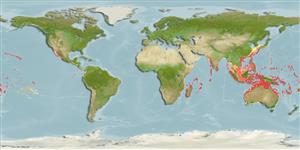Common names from other countries
Environment: milieu / climate zone / depth range / distribution range
Ecologia
marinhas associadas(os) a recifes; não migratória; intervalo de profundidade 10 - 95 m (Ref. 58302), usually 24 - ? m. Tropical
Indo-West Pacific: widespread, from the Gulf of Aden and Oman along the East African
coast to South Africa to the Tuamotu archipelago, north-eastward to the Johnston Atoll and Hawaii, northward up to Ogasawara Island, southward through the Coral Sea down to New South Wales, Australia.
Tamanho / Peso / Idade
Maturity: Lm ? range ? - ? cm
Max length : 8.4 cm TL macho/indeterminado; (Ref. 30840)
This species differs from its congeners in having an almost transparent (except for
a dark anterior part of the dorsal- and ventral margin), slightly whitish to yellowish caudal fin
versus the dark blue caudal fin in C. argi and C. aurantonotus or a bright yellow to orange caudal fin with a dark blue distal margin in C. resplendens Ref. 53274).
Benthopelagic species found in reefs (Ref. 58302); in coral bottoms of channels and over reef slopes (Ref. 9710); also in areas with rubble bottom (Ref. 4858). Often in small loose groups on inner reefs in low patches of brittle corals and coralline algae mix that is shared by damselfishes and small wrasses (Ref. 48636). Herbivorous (Ref. 33482). Occasionally exported through the aquarium trade (Ref. 48391).
Life cycle and mating behavior
Maturidade | Reprodução | Desova | Ovos | Fecundidade | Larvas
Bi-directional sex change has been confirmed for this species (Ref. 103751).
Allen, G.R., 1985. Butterfly and angelfishes of the world. Vol. 2. 3rd edit. in English. Mergus Publishers, Melle, Germany. (Ref. 4858)
Categoria na Lista Vermelha da IUCN (Ref. 130435)
CITES (Ref. 128078)
Not Evaluated
Ameaça para o homem
Harmless
Utilização humana
Aquário: Espécies comerciais
Mais informação
ReferênciasAquaculturaPerfil para aquaculturaEstirpesGenéticaElectrophoresesHereditariedadeDoençasProcessamentoMass conversion
Ferramentas
Relatórios especiais
Descarregue XML
Fontes da internet
Estimates based on models
Preferred temperature (Ref.
115969): 23.6 - 28.4, mean 27.1 (based on 258 cells).
Phylogenetic diversity index (Ref.
82804): PD
50 = 0.5000 [Uniqueness, from 0.5 = low to 2.0 = high].
Bayesian length-weight: a=0.03311 (0.01660 - 0.06605), b=2.83 (2.66 - 3.00), in cm Total Length, based on LWR estimates for this species & (Sub)family-body (Ref.
93245).
Nível Trófico (Ref.
69278): 2.8 ±0.33 se; based on food items.
Resiliência (Ref.
120179): Elevada, tempo mínimo de duplicação da população menor que 15 meses (Preliminary K or Fecundity.).
Fishing Vulnerability (Ref.
59153): Low vulnerability (10 of 100).
